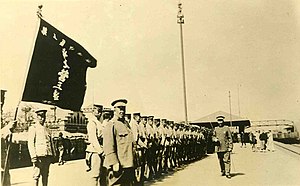
Back Ejército del Noreste Spanish Armée du Nord-Est French 동북군 Korean Северо-Восточная армия Russian 东北军 Chinese
| Northeastern Army | |
|---|---|
 A company of Northeastern Army soldiers | |
| Active | 1911–1937 |
| Allegiance |
|
| Size | 170,000–250,000 soldiers (1924)[1][2] 4 gunboats and 7 support craft (1929)[3] 40–100 planes (1924)[4][5][6] |
| Headquarters | Shenyang, Liaoning |
| Foreign Suppliers | |
| Major Engagements | |
| Commanders | |
| Commander-in-chief |
|
| Notable commanders | |
| Northeastern Army | |||||||||
|---|---|---|---|---|---|---|---|---|---|
| Traditional Chinese | 東北軍 | ||||||||
| Simplified Chinese | 东北军 | ||||||||
| Literal meaning | "Northeast Army" | ||||||||
| |||||||||
The Northeastern Army, also known as the Fengtian Army (see terminology), was a Chinese army that existed from 1911 to 1937. General Zhang Zuolin developed it as an independent fighting force during the Warlord Era. He used the army to control Northeastern China (Manchuria) and intervene in the national politics. During the mid-1920s the Northeastern Army was the dominant military force in China, but in 1928 it was defeated by the Kuomintang's National Revolutionary Army (NRA) during the Northern Expedition. At the end of that campaign, Zhang Zuolin was assassinated and succeeded by his son Zhang Xueliang. When Xueliang subsequently pledged loyalty to the Kuomintang, the Northeastern Army became part of the NRA and was officially rechristened the "Northeastern Border Defense Force".
Despite being formally part of the NRA, the Northeastern Army remained de facto Zhang Xueliang's personal army. Zhang used the army to exercise considerable political influence during the tumultuous early years of the Nanjing Decade. The Japanese invaded Manchuria in 1931 and forced the Northeastern Army to retreat into northern China. After the army was unable to prevent further Japanese annexations of Chinese territory, Zhang was temporarily removed from command. In 1935, the army was reassigned to the Gansu-Ningxia border area in an attempt to encircle the Chinese Communist Party (CCP)'s base there. Both Zhang and his soldiers resented fighting fellow Chinese while Manchuria was under occupation. They negotiated a covert ceasefire with the CCP and hoped to convince Chiang Kai-shek to endorse a united front against Japan. After Chiang refused, the Northeastern Army kidnapped him and forced him to negotiate with the Communists. Although Chiang eventually agreed to end the civil war and work with the Communists against Japan, Zhang was placed under house arrest and the Northeastern Army was divided and reassigned to other commands.
- ^ Tong 2012, p. 121.
- ^ Waldron 1995, p. 94.
- ^ Walker 2017, pp. 162–163.
- ^ Waldron 1995, p. 50.
- ^ Chi 1976, pp. 117–118.
- ^ McCormack 1977, p. 108.